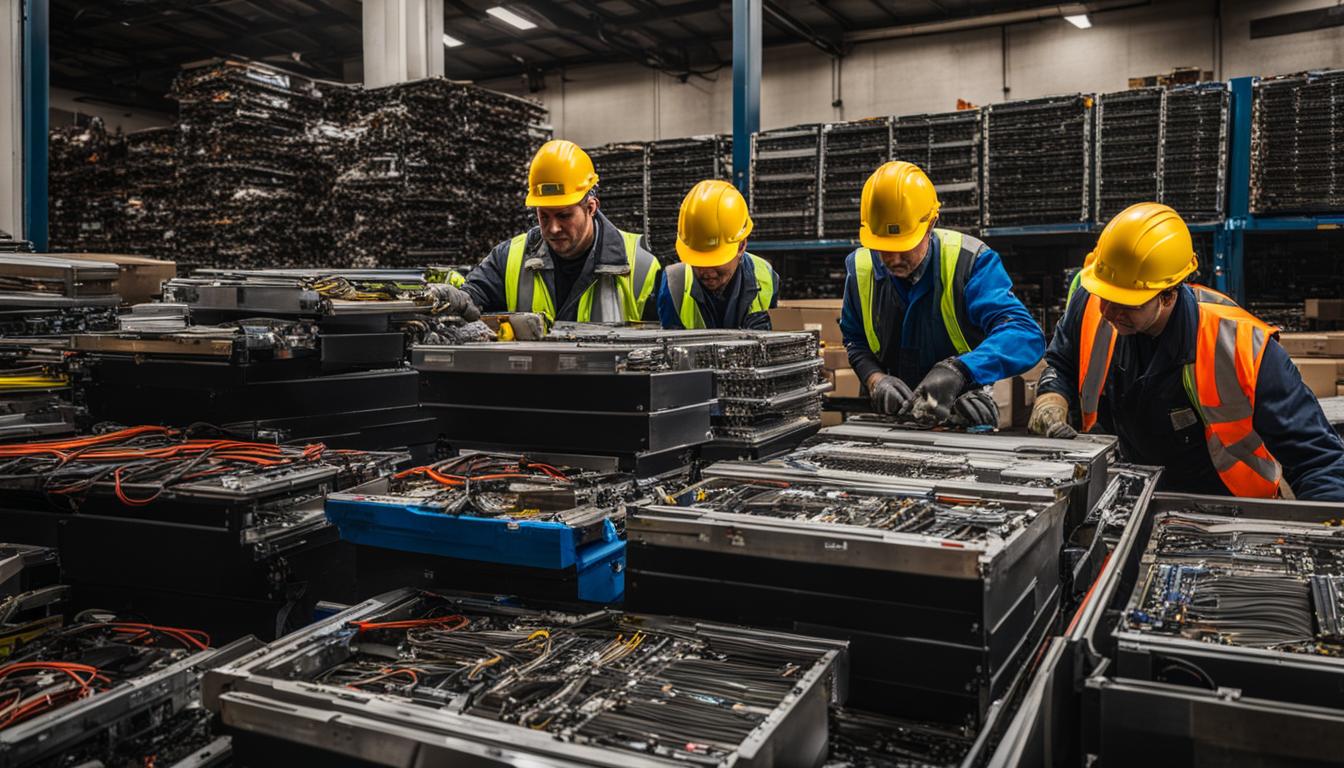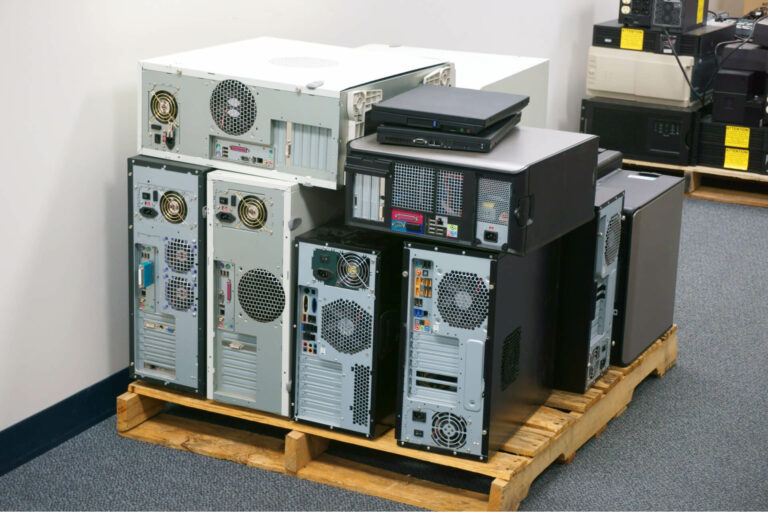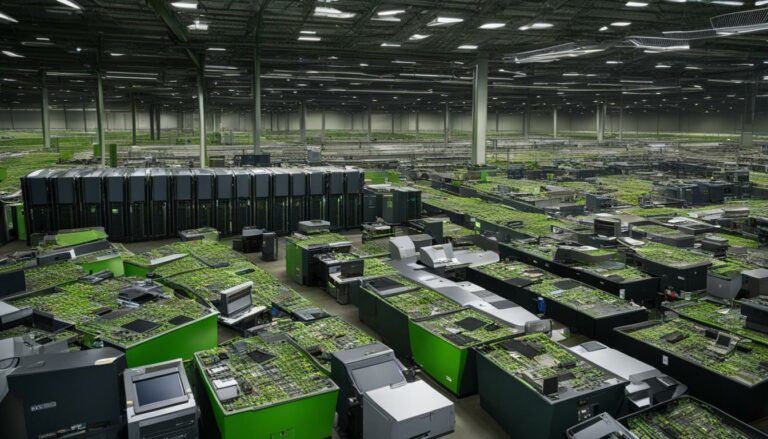Server Recycling: Getting the Most from Decommissioned Hardware
As technology evolves at a rapid pace, businesses often find themselves with decommissioned servers. Rather than letting these valuable assets go to waste, server recycling provides a sustainable solution for both the environment and the bottom line. By recycling server hardware, businesses can reduce e-waste, recover valuable materials, and promote a circular economy. In this article, we will explore the environmental impact of decommissioned servers, the benefits of server recycling, the process involved, the risks of improper disposal, and how to choose a reputable server recycling service.
Key Takeaways
- Server recycling is an environmentally friendly solution for decommissioned hardware.
- Recycling servers helps reduce e-waste and promotes a circular economy.
- Choosing a reputable server recycling service ensures data security and compliance with environmental regulations.
- EcoGreen is a leading provider of server recycling services, prioritizing environmental sustainability and secure data destruction.
- Server recycling offers businesses the opportunity to minimize their carbon footprint and optimize their IT asset disposition practices.
The Environmental Impact of Decommissioned Servers
Decommissioned servers can have a significant environmental impact if not recycled properly. These servers contain hazardous materials like lead, mercury, and cadmium that can leach into the soil and water if not disposed of responsibly. E-waste from servers contributes to pollution and poses a risk to ecosystems and human health. Recycling servers helps prevent these harmful effects by reducing e-waste, recovering valuable metals, and promoting a more sustainable production cycle.
Proper server recycling is crucial to minimize the environmental impact of decommissioned servers. By recycling servers, businesses can help prevent the release of hazardous substances into the environment and reduce the demand for new resources. Recovering valuable metals from recycled servers reduces the need for environmentally destructive mining practices. Additionally, recycling servers promotes a circular economy by extracting reusable materials from old equipment, reducing the reliance on virgin resources.
| Environmental Impact of Decommissioned Servers | Benefits of Server Recycling |
|---|---|
| Leaching of hazardous materials into soil and water | Reduces e-waste |
| Pollution and risk to ecosystems and human health | Recovers valuable metals |
| Contributes to sustainable production cycles | Promotes a circular economy |
Quote:
“Server recycling plays a crucial role in reducing the environmental impact of decommissioned servers and preventing the release of hazardous substances into the environment.”
By properly recycling servers, businesses can actively contribute to environmental sustainability and minimize the negative repercussions of e-waste. Choosing a reputable server recycling service ensures that the servers are disposed of responsibly, minimizing the risk of environmental contamination. Moreover, server recycling offers a more sustainable approach to IT asset disposition, aligning with the principles of the circular economy and reducing the overall carbon footprint of the technology industry.
By prioritizing server recycling and partnering with certified ITAD providers like EcoGreen, businesses can effectively address the environmental impact of decommissioned servers while ensuring data security and compliance with regulations.
The Benefits of Server Recycling
Server recycling offers numerous benefits, both environmentally and economically. By recycling servers, businesses can contribute to a more sustainable future by reducing e-waste and minimizing their carbon footprint. Let’s explore the key benefits of server recycling:
Environmental Benefits
- Reduces e-waste: Recycling servers helps divert electronic waste from landfills, preventing harmful materials from polluting the environment.
- Conserves resources: By extracting reusable materials and rare metals from decommissioned servers, recycling minimizes the need for new resource extraction.
- Lower carbon footprint: The manufacturing process for new servers consumes energy and releases greenhouse gases. Recycling servers reduces the demand for new production, resulting in lower carbon emissions.
Economic Benefits
- Cost savings: Server recycling can generate revenue through the resale of refurbished parts or the extraction of valuable metals.
- Tax incentives: Some jurisdictions offer tax benefits or incentives for businesses that recycle their servers, further enhancing the economic advantage of recycling.
- Brand reputation: Demonstrating a commitment to environmental responsibility through server recycling can enhance a business’s reputation and attract eco-conscious customers.
Additionally, server recycling plays a crucial role in data security. Protecting sensitive information is a top priority for businesses, and working with a certified server recycling service ensures proper data destruction. Server recycling companies employ secure data wiping or destruction methods to ensure that sensitive data is permanently erased and cannot be recovered.
Overall, the benefits of server recycling are twofold: it helps businesses reduce their environmental impact and contribute to a greener future, while also offering economic advantages and ensuring data security. By choosing a reputable server recycling service, businesses can optimize their bottom line, promote eco-responsibility, and play a part in building a sustainable and secure digital landscape.
The Process of Server Recycling
Server recycling involves a series of steps designed to ensure proper disposal and maximize the potential for reusing or recovering valuable materials. The process is carried out by certified IT Asset Disposition (ITAD) organizations that adhere to strict environmental, health, and safety standards. Here is an overview of the key steps involved in server recycling:
1. Planning
In the planning stage, the server recycling service assesses the requirements and scope of the project. This includes determining the number and types of servers to be recycled, as well as any specific data destruction or disposal requirements. A comprehensive plan is then developed to ensure the efficient and secure handling of the servers throughout the recycling process.
2. Sorting and Disassembly
Once the planning stage is complete, the servers are sorted based on their condition and potential for reuse or recycling. Any data-bearing components, such as hard drives, are securely wiped or destroyed to ensure the protection of sensitive information. The servers are then disassembled, with reusable parts identified for refurbishment or resale.
3. Disposal and Material Recovery
The non-reusable components of the servers are separated by material type, such as plastic, metal, or glass. Each material is processed accordingly, with a focus on recovering valuable elements and safely disposing of hazardous materials. This includes extracting rare metals like gold, silver, and palladium, which can be reused or sold in the market. The goal is to minimize waste and promote a circular economy.
4. Documentation and Certification
Throughout the server recycling process, proper documentation is maintained to track the handling and disposal of the servers. This documentation ensures compliance with environmental regulations and provides transparency for auditing purposes. It also includes certificates of data destruction and recycling, providing assurance to businesses that their servers have been responsibly and securely disposed of.
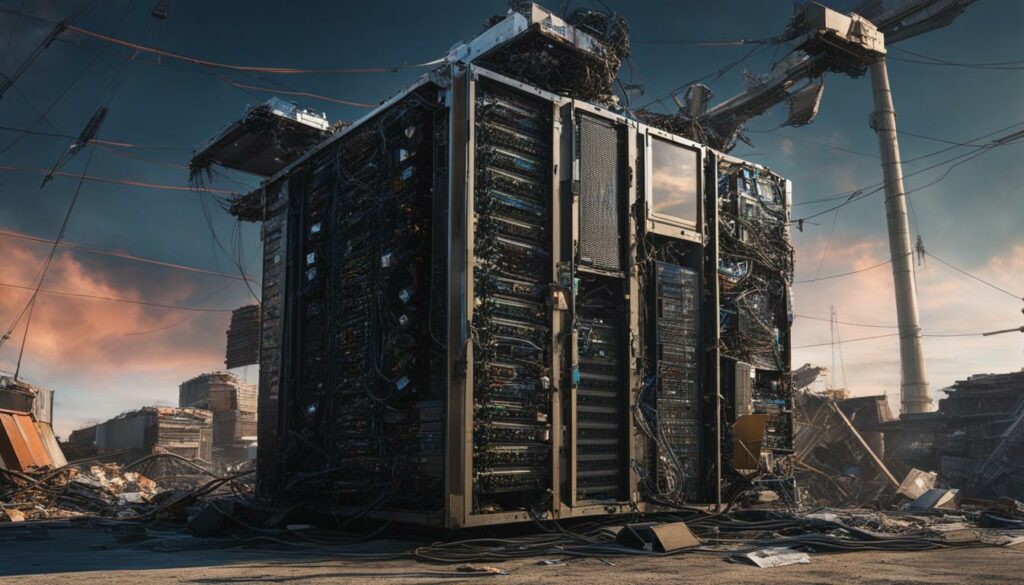
| Stage | Description |
|---|---|
| Planning | Assessment of project requirements and development of a comprehensive plan for secure handling and disposal. |
| Sorting and Disassembly | Separation of servers based on condition and disassembly of components, with data destruction for sensitive information. |
| Disposal and Material Recovery | Separation of non-reusable components by material type for processing, including recovery of valuable metals. |
| Documentation and Certification | Maintenance of proper documentation to track handling and disposal, along with certificates of data destruction and recycling. |
The Risks of Improper Server Disposal
Improper disposal of servers poses significant risks to both the environment and data security. When servers are not disposed of properly, they contribute to the growing problem of e-waste. E-waste, which includes discarded electronic devices, contains hazardous materials that can harm the environment and human health.
Old servers often contain toxic substances such as lead, mercury, and cadmium. When these servers are improperly disposed of, these harmful substances can leach into the soil and water, contaminating ecosystems and posing a risk to wildlife and humans alike. The improper disposal of servers contributes to pollution and environmental degradation, exacerbating the already pressing issues surrounding electronic waste.
In addition to the environmental hazards, improper server disposal also exposes businesses to data security risks. Servers often contain sensitive or confidential information that, if not properly destroyed, can be accessed by unauthorized individuals. This puts businesses at risk of data breaches, identity theft, and other cybersecurity threats. Therefore, it is crucial for businesses to choose a reputable server recycling service that ensures proper data destruction to mitigate these risks.
| Risks of Improper Server Disposal | Potential Impact |
|---|---|
| Environmental Hazards | Leaching of toxic substances into the soil and water, contributing to pollution and ecosystem damage |
| Data Security Risks | Exposure of sensitive information, leading to data breaches and identity theft |
By choosing a reputable server recycling service, businesses can ensure that their decommissioned servers are disposed of in an environmentally responsible and secure manner. Such services employ proper recycling techniques that prioritize the extraction of valuable materials and the safe disposal of hazardous substances. By mitigating the risks associated with improper server disposal, businesses can protect both the environment and their valuable data.
Choosing a Server Recycling Service
When it comes to server recycling, choosing the right service provider is crucial. Not only does it ensure the proper disposal of your decommissioned servers, but it also protects the security of your data and demonstrates your commitment to environmental responsibility. To make an informed decision, consider the following factors:
1. Data Security
Data security is of utmost importance when disposing of servers. Look for a server recycling service that offers secure data destruction methods, such as certified data wiping or physical destruction. Ensure that the service provider follows industry standards and regulations to safeguard sensitive information throughout the entire disposal process.
2. Environmental Responsibility
Choose a server recycling service that prioritizes environmental responsibility. Look for certifications like e-Stewards or R2, which demonstrate a commitment to sustainable practices and responsible e-waste management. Verify that the service provider follows proper recycling protocols and disposes of hazardous materials safely to minimize environmental impact.
3. Certified ITAD Provider
An IT Asset Disposition (ITAD) provider with certifications ensures that they adhere to strict standards and best practices. A certified provider will have the knowledge and expertise to handle server recycling in a compliant manner. Look for certifications such as ISO 14001 for environmental management and ISO 27001 for data security.
By prioritizing data security, environmental responsibility, and choosing a certified ITAD provider, you can confidently select a server recycling service that aligns with your business values. This ensures that your decommissioned hardware is disposed of properly while protecting your data and minimizing your environmental impact.
The Role of EcoGreen in Server Recycling
EcoGreen is a leading provider of server recycling services, committed to environmental sustainability and data security. With a focus on secure disposal of servers and responsible data destruction, EcoGreen offers comprehensive solutions for businesses looking to dispose of their decommissioned hardware responsibly. By partnering with EcoGreen, businesses can not only contribute to environmental sustainability but also ensure the safe and responsible disposal of their servers.
One of the key services offered by EcoGreen is secure data destruction. They understand the importance of protecting sensitive information and ensure that all data-bearing components of the servers are securely wiped or destroyed. This helps businesses safeguard their data and prevents the risk of data breaches or identity theft.
EcoGreen also prioritizes environmental sustainability in their server recycling process. They adhere to strict environmental guidelines and certifications, such as e-Stewards or R2, ensuring that the recycling process is conducted responsibly and with minimal impact on the environment. By reclaiming rare metals and extracting reusable materials from decommissioned servers, EcoGreen promotes a circular economy and reduces the need for new resource extraction.
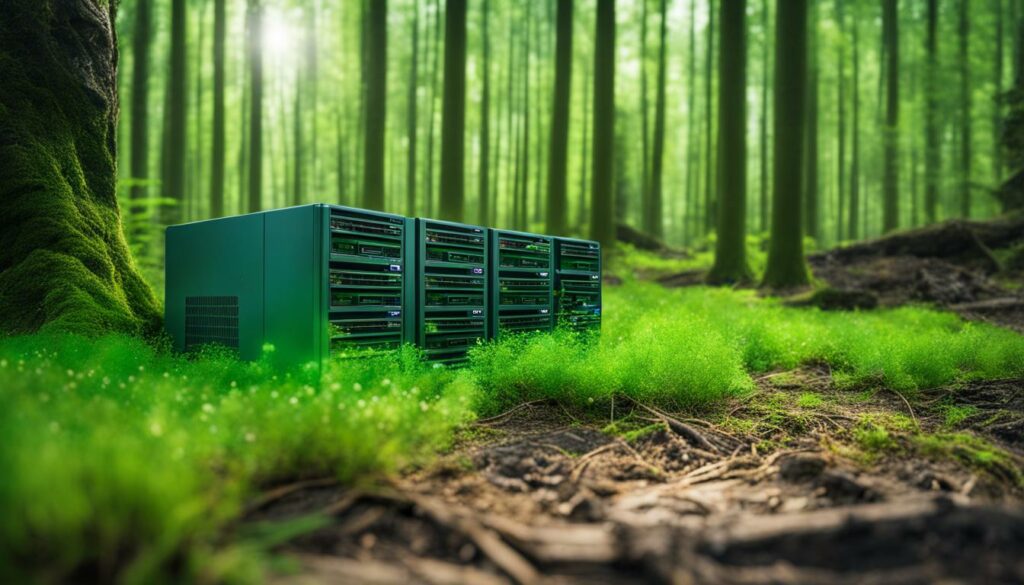
Choosing EcoGreen as a server recycling partner means aligning with a company that shares the values of environmental responsibility and data security. By entrusting the disposal of decommissioned servers to EcoGreen, businesses can contribute to a greener future while optimizing their IT asset disposition practices.
Conclusion
Server recycling is a responsible and sustainable solution for the disposal of decommissioned hardware. By choosing to recycle servers, businesses can minimize their environmental impact, promote a circular economy, and ensure data security.
One of the key benefits of server recycling is the reduction of e-waste. By recycling servers, valuable materials can be recovered and reused, preventing the extraction of new resources and minimizing the carbon footprint associated with manufacturing new servers.
Furthermore, responsible server disposal is crucial for ensuring data security. When partnering with a reputable server recycling service like EcoGreen, businesses can have peace of mind knowing that their sensitive information will be securely destroyed or wiped, in compliance with data protection regulations.
By prioritizing server recycling, businesses can actively contribute to a greener future while optimizing their IT asset disposition practices. With EcoGreen’s comprehensive server recycling services, environmental sustainability and data security go hand in hand, allowing businesses to make a positive impact while disposing of their servers responsibly.
FAQ
What is server recycling?
Server recycling is the process of responsibly disposing of decommissioned servers and recovering valuable materials from them for reuse or recycling.
Why is server recycling important?
Server recycling is important to reduce e-waste, prevent environmental pollution, recover valuable materials, and promote a more sustainable production cycle.
What are the benefits of server recycling?
Server recycling provides environmental benefits by reducing e-waste and lowering the carbon footprint. It also allows for the recovery of rare metals and reusable materials, promoting a circular economy.
How does server recycling ensure data security?
Certified server recycling services securely wipe or destroy sensitive data-bearing components to ensure data security and prevent the risk of data breaches or identity theft.
What is the process of server recycling?
The process of server recycling includes planning, sorting, disassembling, and disposing of server components. Certified IT Asset Disposition (ITAD) organizations follow strict guidelines and comply with environmental and safety standards.
What are the risks of improper server disposal?
Improper server disposal poses risks to the environment, including pollution and the release of toxic substances into soil and water. It also exposes sensitive data to the risk of data breaches and identity theft.
How should I choose a server recycling service?
It’s important to choose a reputable server recycling service that prioritizes data security, environmental responsibility, and compliance with regulations. Look for certifications like e-Stewards or R2.
What role does EcoGreen play in server recycling?
EcoGreen is a leading provider of server recycling services, offering secure data destruction and proper disposal of servers. Their commitment to environmental sustainability ensures that rare metals are reclaimed and reusable materials are extracted from decommissioned servers.

